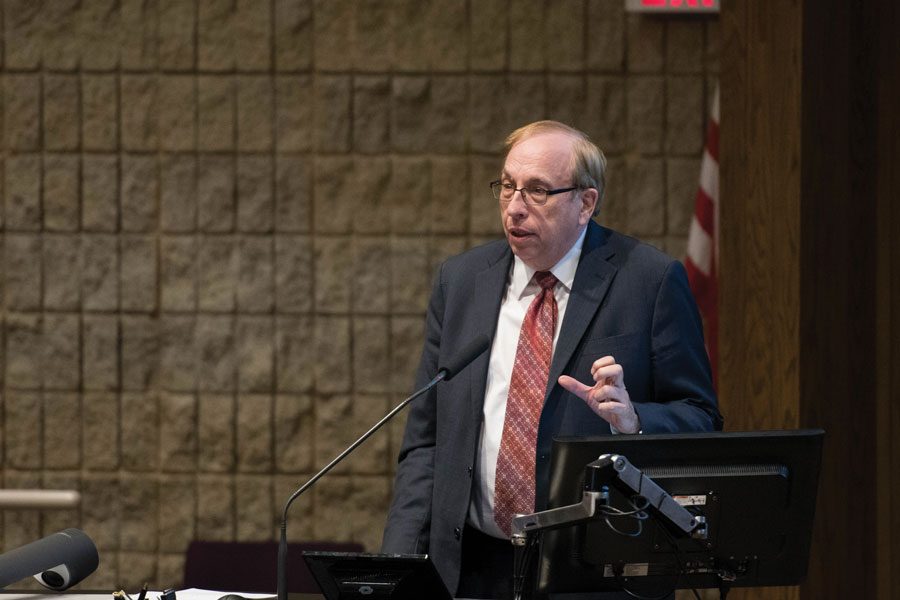One Book One Northwestern hosts panel on climate
Lauren Duquette/Daily Senior Staffer
University of Illinois Prof. Don Wuebbles speaks during a One Book One Northwestern event at the Donald P. Jacobs Center on Thursday. Wuebbles was part of a panel that discussed sustainable public policy and climate change.
April 20, 2017
A panel of climate experts said the planet is at risk from effects of climate change and criticized climate change denialism during an event Thursday.
The panel, hosted by One Book One Northwestern at the Donald P. Jacobs Center, included WGN-TV chief meteorologist Tom Skilling, atmospheric scientist Don Wuebbles and Karen Weigert, former chief of sustainability for the City of Chicago. The panelists discussed climate change and sustainable public policy in front of an audience of about 50 people.
The panelists highlighted the importance of statistical methods for predicting everything from day-to-day weather events to long-term trends like climate change. They also addressed climate change denial and the dangers of ignoring scientific warnings about carbon emissions and temperature increases.
Earth and planetary sciences Prof. Daniel Horton, who organized the event, told The Daily the concepts discussed by One Book author Nate Silver in “The Signal and the Noise: Why So Many Predictions Fail — but Some Don’t” are highly applicable to the field of climate science.
Silver’s book on statistics discusses how people can make predictions and discern important patterns from a large volume of complex data.
Horton said the purpose of the event was to question how the concepts of signal and noise are used in the policy arena.
“How do we implement policy despite noise in the scientific background of the things we study?” Horton told The Daily before the event.
During the event, panelists examined various methods to predict and combat climate change.
Skilling said “ensemble forecasting” has dramatically improved the accuracy of weather and climate prediction. Ensemble forecasting uses the averages of a large number of models to reduce rates of error, he said. These improved models could help reduce fatalities from lightning, heat waves and hurricanes, he said.
In addition to creating more accurate models, Weigert said effective public policy is necessary to create sustainable spaces, preserve public health and reduce the impact of climate change. She highlighted the leading role Chicago and cities like it play in reducing the world’s carbon footprint.
Weigert said population density and public transportation help decrease the environmental impact of human populations.
“When you live in a city, you are more likely to walk, you have a transit system, you are more likely to be in multi-family housing, apartments or condos where you share walls and where your square footage is a little lower,” she said.
During his presentation, Wuebbles challenged a temperature model made by climate skeptics, pointing out how the creators of the model picked and chose data sets to get the result they wanted.
“The myth of cooling or that climate change has stopped is just that, a myth or alternative facts as we tend to hear today,” Wuebbles said. “The truth is that if you look over long time periods the warming is very clear.”
Despite concerns regarding climate change, the panelists said decisive actions can mitigate the effects of global warming and extreme weather.
McCormick sophomore Ryan Albelda, who attended the event, said she enjoyed that each panelist came from a different field.
“I’ve gone to other climate talks and they’re normally one person from one specific field,” Albelda said, “but this one tied together ideas and themes from across multi-disciplines and it made it more appealing to a wider audience.”
Email: [email protected]
Twitter: @ed_bannister


